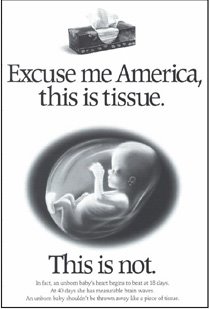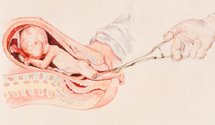Speaking as a Former Fetus, I was Always a Human Being—According to Philosophy
 This is Part 4 of the "Scream Bloody Murder" series of postings. [For a list of all the postings in this series, scroll to the end of the initial post “Scream Bloody Murder.”]
This is Part 4 of the "Scream Bloody Murder" series of postings. [For a list of all the postings in this series, scroll to the end of the initial post “Scream Bloody Murder.”] Many people express doubt that as a fetus I was really a human being and so they see no need to go around “screaming bloody murder” about the killing of human beings in the womb. To answer such a shallow claim we are continuing to look at arguments which show I was always a human being—before I emerged from my mother’s womb and even from the time of my conception.
Philosophy Certified my Humanity as a Fetus
[excerpts from Life Training Institute “The Case for Life”]
As Stephen Schwarz points out using the acronym SLED, differences of size, level of development, environment, and degree of dependency are not relevant in the way that abortion advocates need them to be.
Sadly, opponents of the pro-life view believe that human beings that are in the wrong location or have the wrong level of development do not deserve the protection of law. They assert, without justification, the belief that strong and independent people deserve the protection of law while small and dependent people do not. This view is elitist and exclusive. It violates the principle that once made political liberalism great: a basic commitment to protect the most vulnerable members of the human community.
We can do better than that. In the past, we used to discriminate on the basis of skin color and gender, but now, with elective abortion, we discriminate on the basis of size, level of development, location, and degree of dependency. We've simply exchanged one form of bigotry for another.
In sharp contrast, the position I have defended is that no human being, regardless of size, level of development, race, gender, or place of residence, should be excluded from the moral community of human persons. In other words, the pro-life view of humanity is inclusive, indeed wide open, to all, especially those that are small, vulnerable and defenseless.
Next posting in this series:
Part 5 Speaking as a Former Fetus, I was Always a Human Being—According to Theology
For a more thorough treatment of this subject matter covered in this posting the reader can refer to the information available at Life Training Institute or consult the excellent online treatise by Dr. Stephen Schwarz entitled The Moral Question of Abortion. Also, Dr. Francis Beckwith’s new book Defending Life: A Moral and Legal Case Against Abortion Choice can now be purchased. I blogged a little about this book recently.
Labels: pro-life apologetics, scream bloody murder


























0 Comments:
Post a Comment
<< Home